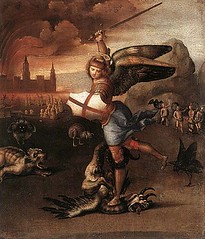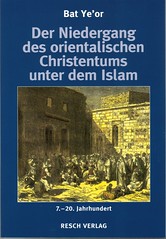The last subject but one in our appreciation of the great Mohammedan attack upon the Catholic Church and the civilization she had produced, is the sudden last effort and subsequent rapid decline of Mohammedan political power just after it had reached its summit. The last subject of all in this connection, the one which I will treat next, is the very important and almost neglected question of whether Mohammedan power may not re-arise in the modern world. If we recapitulate the fortunes of Islam after its triumph in beating back the Crusaders and restoring its dominion over the East and confirming its increasing grasp over half of what had once been a united Graeco-Roman Christendom, Islam proceeded to develop two completely different and even contradictory fortunes: it was gradually losing its hold on Western Europe while it was increasing its hold over South-eastern Europe. In Spain it had already been beaten back halfway from the Pyrenees to the Straits of Gibraltar before the Crusades were launched and it was destined in the next four to five centuries to lose every inch of ground which it had governed in the Iberian Peninsula: today called Spain and Portugal. Continental Western Europe (and even the islands attached to it) was cleared of Mohammedan influence during the last centuries of the Middle Ages, the twelfth to fifteenth centuries. This was because Mohammedans of the West, that is, what was then called "Barbary," what is now French and Italian North Africa, were politically separated from the vast majority of the Mohammedan world which lay to the East. Between the Barbary states (which we call today Tunis, Algiers and Morocco) and Egypt, the desert made a barrier difficult to cross. The West was less barren in former times than it is today, and the Italians are reviving its prosperity. But the vast stretches of sand and gravel, with very little water, always made this barrier between Egypt and the West a deterrent and an obstacle. Yet, more important than this barrier was the gradual disassociation between the Western Mohammedans of North Africa and the mass of Mohammedans to the East thereof. The religion indeed remained the same and the social habits and all the rest. Mohammedanism in North Africa remained one world with Mohammedanism in Syria, Asia and Egypt, just as the Christian civilization in the West of Europe remained for long one world with the Christian civilization of Central Europe and even of Eastern Europe. But distance and the fact that Eastern Mohammedans never sufficiently came to their help made the Western Mohammedans of North Africa and of Spain feel themselves something separate politically from their Eastern brethren. To this we must add the factor of and its effect on seapower in those days and in those waters. The Mediterranean is much more than two thousand miles long; the only period of the year in which any effective fighting could be done on its waters under mediaeval conditions was the late spring, summer and early autumn and it is precisely in those five months of the year, when alone men could use the Mediterranean for great expeditions, that offensive military operations were handicapped by long calms. It is true these were met by the use of many-oared galleys so as to make fleets as little dependent on wind as possible, but still, distances of that kind did make unity of action difficult. Therefore, the Mohammedans of North Africa not being supported at sea by the wealth and numbers of their brethren from the ports of Asia Minor and of Syria and the mouths of the Nile, gradually lost control of maritime communications. They lost, therefore, the Western islands, Sicily and Corsica and Sardinia, the Balearics and even Malta at the very moment when they were triumphantly capturing the Eastern islands in the Aegean Sea. The only form of sea power remaining to the Mohammedan in the West was the active piracy of the Algerian sailors operating from the lagoon of Tunis and the half-sheltered bay of Algiers. (The word "Algiers"comes from the Arabic word for "islands." There was no proper harbour before the French conquest of a hundred years ago, but there was a roadstead partially sheltered by a string of rocks and islets.) These pirates remained a peril right on until the seventeenth century. It is interesting to notice, for instance, that the Mohammedan call to prayer was heard on the coasts of Southern Ireland within the lifetime of Oliver Cromwell, for the Algerian pirates darted about everywhere, not only in the Western Mediterranean but along the coasts of the Atlantic, from the Straits of Gibraltar to the English Channel. They were no longer capable of conquest, but they could loot and take prisoners whom they held to ransom. While this beating back of the Mohammedan into Africa was going onto the Western side of Europe, exactly the opposite was happening on the side. After the Crusades had failed Mohammedans made themselves secure in Asia Minor and began that long hammering at Constantinople which finally succeeded. Constantinople was by far the richest and greatest capital of the Ancient World; it was the old centre of Greek and Roman civilization and even when it had lost all direct political power over Italy, and still more over France, it continued to be revered as the mighty monument of the Roman past. The Emperor of Constantinople was the direct heir of the Caesars. On the military side this very strong city supported by great masses of tribute and by a closely knit, well disciplined army, was the bulwark of Christendom. So long as Constantinople stood as a Christian city and Mass was still said in St. Sophia, the doors of Europe were locked against Islam. It fell in the same generation that saw the expulsion of the last Mohammedan Government from Southern Spain. Men who in their maturity marched into Granada with the victorious armies of Isabella the Catholic could remember how, in early childhood, they had heard the awful news that Constantinople itself had fallen to the enemies of the Church. The fall of Constantinople at the end of the Middle Ages (1453) was only the beginning of further Mohammedan advances. Islam swept allover the Balkans; it took all the Eastern Mediterranean islands, Crete and Rhodes and the rest; it completely occupied Greece; it began pushing up the Danube valley and northwards into the great plains; it destroyed the ancient kingdom of Hungary in the fatal battle of Mohacs and at last, in the first third of the sixteenth century, just at the moment when the storm of the Reformation had broken out Islam threatened Europe close at hand, bringing pressure upon the heart of the Empire, at Vienna. It is not generally appreciated how the success of Luther's religious revolution against Catholicism in Germany was due to the way in which Mohammedan pressure from the East was paralysing the central authority of the German Emperors. They had to compromise with the leaders of the religious revolution and try to patch up a sort of awkward peace between the irreconcilable claims of Catholic authority and Protestant religious theory in order to meet the enemy at their gates; the enemy which had already overthrown Hungary and might well overthrow all of Southern Germany and perhaps reach the Rhine. If Islam had succeeded in doing this during the chaos of violent civil dissension among the Germans, due to the launching of the Reformation, our civilization would have been as effectively destroyed as it would have been if the first rush of the Mohammedans through Spain had not been checked and beaten back eight centuries earlier in the middle of France. This violent Mohammedan pressure on Christendom from the East made a bid for success by sea as well as by land. The last great wave of Mongol soldiery, the last great Turkish organization working now from the conquered capital of Constantinople, proposed to cross the Adriatic, to attack Italy by sea and ultimately to recover all that had been lost in the Western Mediterranean. There was one critical moment when it looked as though the scheme would succeed. A huge Mohammedan armada fought at the mouth of the Gulf of Corinth against the Christian fleet at Lepanto. The Christians won that naval action and the Western Mediterranean was saved. But it was a very close thing, and the name of Lepanto should remain in the minds of all men with a sense of history as one of the half dozen great names in the history of the Christian world. It has been a worthy theme for the finest battle poem of our time, "The Ballad of Lepanto," by the late Mr. Gilbert Chesterton. Today we are accustomed to think of the Mohammedan world assomething backward and stagnant, in all material affairs at least. We cannot imagine a great Mohammedan fleet made up of modern ironclads andsubmarines, or a great modern Mohammedan army fully equipped with modern artillery, flying power and the rest. But not so very long ago, the Mohammedan Government centred at Constantinople had better artillery and better army equipment of every kind than had we Christians in the West. The last effort they made to destroy Christendom was contemporary with the end of the reign of Charles II in England and of his brother James and of the usurper William III. It failed during the last years of the seventeenth century, only just over two hundred years ago. Vienna, as we saw, was almost taken and only saved by the Christian army under the command of the King of Poland on a date that ought to be among the most famous inhistory -- September 11, 1683. But the peril remained, Islam was still immensely powerful within a few marches of Austria and it was not until the great victory of Prince Eugene at Zenta in 1697 and the capture of Belgrade that the tide really turned -- and by that time we were at the end of the seventeenth century. It should be fully grasped that the generation of Dean Swift, the men who saw the court of Louis XIV in old age, the men who saw the Hanoverians brought in as puppet Kings for England by the dominating English wealthy class, the men who saw the apparent extinction of Irish freedom after the failure of James II's campaign at the Boyne and the later surrender of Limerick, all that lifetime which overlapped between the end of the seventeenth and the beginning of the eighteenth century,was dominated by a vivid memory of a Mohammedan threat which had nearly nearly made good and which apparently might in the near future be repeated. The Europeans of that time thought of Mohammedanism as we think of Bolshevism or as white men in Asia think of Japanese power today. What happened was something quite unexpected; the Mohammedan power began to break down on the material side. The Mohammedans lost the power of competing successfully with the Christians in the making of those instruments whereby dominion is assured; armament, methods of communication and all the rest of it. Not only did they not advance, they went back. Their artillery became much worse than ours. While our use of the sea vastly increased, theirs sank away till they had no first class ships with which to fight naval battles. The eighteenth century is a story of their gradual losing of the race against the European in material things. When that vast revolution in human affairs introduced by the invention of modern machinery began in England and spread slowly throughout Europe, the Mohammedan world proved itself quite incapable of taking advantage thereof. During the Napoleonic wars, although supported by England, Islam failed entirely to meet the French armies of Egypt; its last effort resulted in complete defeat (the land battle of the Nile). All during the nineteenth century the process continued. As a result, Mohammedan North Africa was gradually subjected to European control; the last independent piece to go being Morocco. Egypt fell under the control of England. Long before that Greece had been liberated, and the Balkan States. Half a lifetime ago it was taken for granted everywhere that the last remnants of Mohammedan power in Europe would disappear. England bolstered it up and did save Constantinople from being taken by the Russians in 1877-78, but it seemed only a question of a few years before the Turks would be wiped out for good. Everyone was waiting for the end of Islam, on this side of the Bosphorus at least; while in Syria, Asia Minor and Mesopotamia it was losing all political and military vigour. After the Great War, what was left of Mohammedan power, even in hither Asia, was only saved by the violent quarrels between the Allies. Even Syria and Palestine were divided between France and England. Mesopotamia fell under the control of England and no menace of Islamic power remained, though it was still entrenched in Asia Minor and kept asort of precarious hold on the thoroughly decayed city of Constantinople alone. The Mediterranean was gone; every inch of European territory was gone; all full control over African territory was gone; and the great duel between Islam and Christendom seemed at last to have been decided in our own day. To what was due this collapse? I have never seen an answer to that question. There was no moral disintegration from within, there was no intellectual breakdown; you will find the Egyptian or Syrian student today, if you talk to him on any philosophical or scientific subject which he has studied, to be the equal of any European. If Islam has no physical science now applied to any of its problems, in arms and communications, it has apparently ceased to be part of our world and fallen definitely below it. Of every dozen Mohammedans in the world today, eleven are actually or virtually subjects of an Occidental power. It would seem, I repeat, asthough the great duel was now decided. But can we be certain it is so decided? I doubt it very much. It has always seemed to me possible, and even probable, that there would be a resurrection of Islam and that our sons or our grandsons would see the renewal of that tremendous struggle between the Christian culture and what has been for more than a thousand years its greatest opponent. Why this conviction should have arisen in the minds of certain observers and travellers, such as myself, I will now consider. It isindeed a vital question, "May not Islam arise again?" In a sense the question is already answered because Islam has never departed. It still commands the fixed loyalty and unquestioning adhesion of all the millions between the Atlantic and the Indus andf urther a field throughout scattered communities of further Asia. But I ask the question in the sense "Will not perhaps the temporal power of Islam return and with it the menace of an armed Mohammedan world which will shake off the domination of Europeans -- still nominally Christian -- and reappear again as the prime enemy of our civilization?" The future always comes as a surprise but political wisdom consists in attempting at least some partial judgment of what that surprise may be. And for my part I cannot but believe that a main unexpected thing of the future is the return of Islam. Since religion is at the root of all political movements and changes and since we have here a very great religion physically paralysed but morally intensely alive, we are in the presence of an unstable equilibrium which cannot remain permanently unstable. Let us then examine the position.
Continued




No comments:
Post a Comment